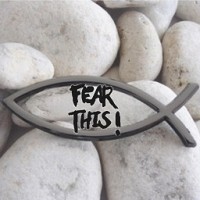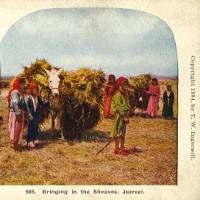Psalm 128:1 A song of ascents. Blessed are all who fear the LORD, who walk in his ways. 2 You will eat the fruit of your labor; blessings and prosperity will be yours. 3 Your wife will be like a fruitful vine within your house; your sons will be like olive shoots around your table. 4 Thus is the man blessed who fears the LORD. 5 May the LORD bless you from Zion all the days of your life; may you see the prosperity of Jerusalem, 6 and may you live to see your children’s children. Peace be upon Israel. (NIV)
Fear of the Lord is really misunderstood by some in our culture. They picture an angry parent taking a belt to the behind of an unruly child to “put the fear of God into him.” Actually, that’s not fear of God. Fear of the parent or fear of the belt, maybe. But not fear of God.
 Fear in general isn’t considered something people like, except perhaps those with “Fear This” decals on their cars. But, I’ve never seen one with an ichthus (Jesus fish symbol) as Fear of the Lord.
Fear in general isn’t considered something people like, except perhaps those with “Fear This” decals on their cars. But, I’ve never seen one with an ichthus (Jesus fish symbol) as Fear of the Lord.
Jesus and fear don’t really seem to go together in the minds of most people. That’s because they misunderstand fear…and they underestimate Jesus as Lord.
“Blessed are all who fear the LORD” is what our passage says. This Blessed Fear might be the title of the discipleship lesson of our ninth Song of Ascents. This fear is a good fear, connected with both wisdom and prosperity.
Fear of the Lord is the beginning of wisdom.
Scripture speaks of this often, perhaps nowhere more eloquently than in the book of Job:
Where then does wisdom come from? Where does understanding dwell? … God understands the way to it and he alone knows where it dwells, for he views the ends of the earth and sees everything under the heavens. When he established the force of the wind and measured out the waters, when he made a decree for the rain and a path for the thunderstorm, then he looked at wisdom and appraised it; he confirmed it and tested it. And he said to man, ‘The fear of the Lord– that is wisdom, and to shun evil is understanding.'” (Job 28:20-28)
So for pilgrims walking in repentance, thanksgiving, and praise Up to Jerusalem, Psalm 128 would be a good reminder to fear the Lord, having an appropriate reverence for the majesty of God whose presence they are preparing to enter. They consider wisdom, blessing, and honor which have been evidence of God’s favor upon their lives. They have been living in the protection of wisdom and fear of the Lord.
This is the Blessed Fear.
For further thought:
- With what have you associated fear of the Lord?
- What do you think when you read this passage? Luke 12:4-5: “I tell you, my friends, do not be afraid of those who kill the body and after that can do no more. But I will show you whom you should fear: Fear him who, after the killing of the body, has power to throw you into hell. Yes, I tell you, fear him.”
- How might this passage inform your reverence for Jesus? Revelation 19:11-16, “I saw heaven standing open and there before me was a white horse, whose rider is called Faithful and True. With justice he judges and makes war. His eyes are like blazing fire, and on his head are many crowns. He has a name written on him that no one knows but he himself. He is dressed in a robe dipped in blood, and his name is the Word of God. The armies of heaven were following him, riding on white horses and dressed in fine linen, white and clean. Out of his mouth comes a sharp sword with which to strike down the nations. ‘He will rule them with an iron scepter.’ He treads the winepress of the fury of the wrath of God Almighty. On his robe and on his thigh he has this name written: KING OF KINGS AND LORD OF LORDS.”








